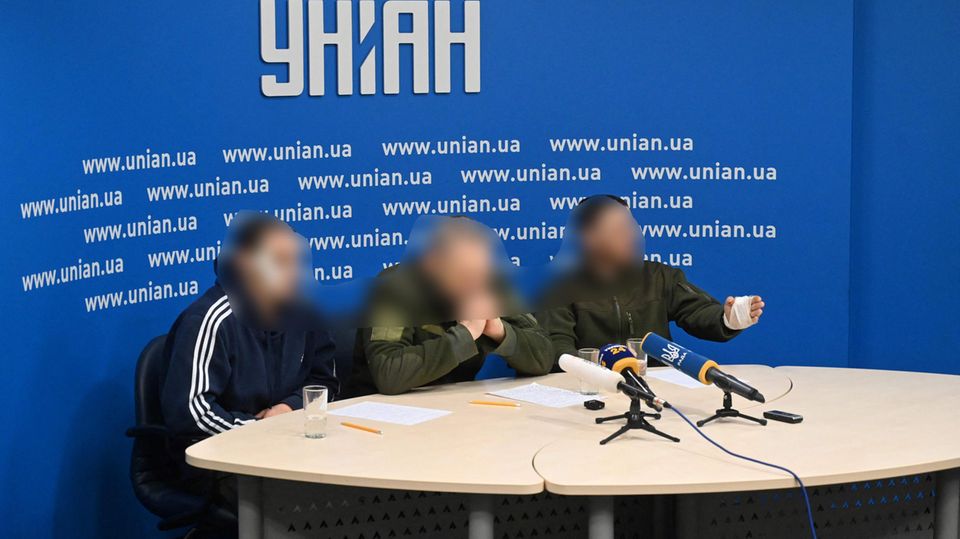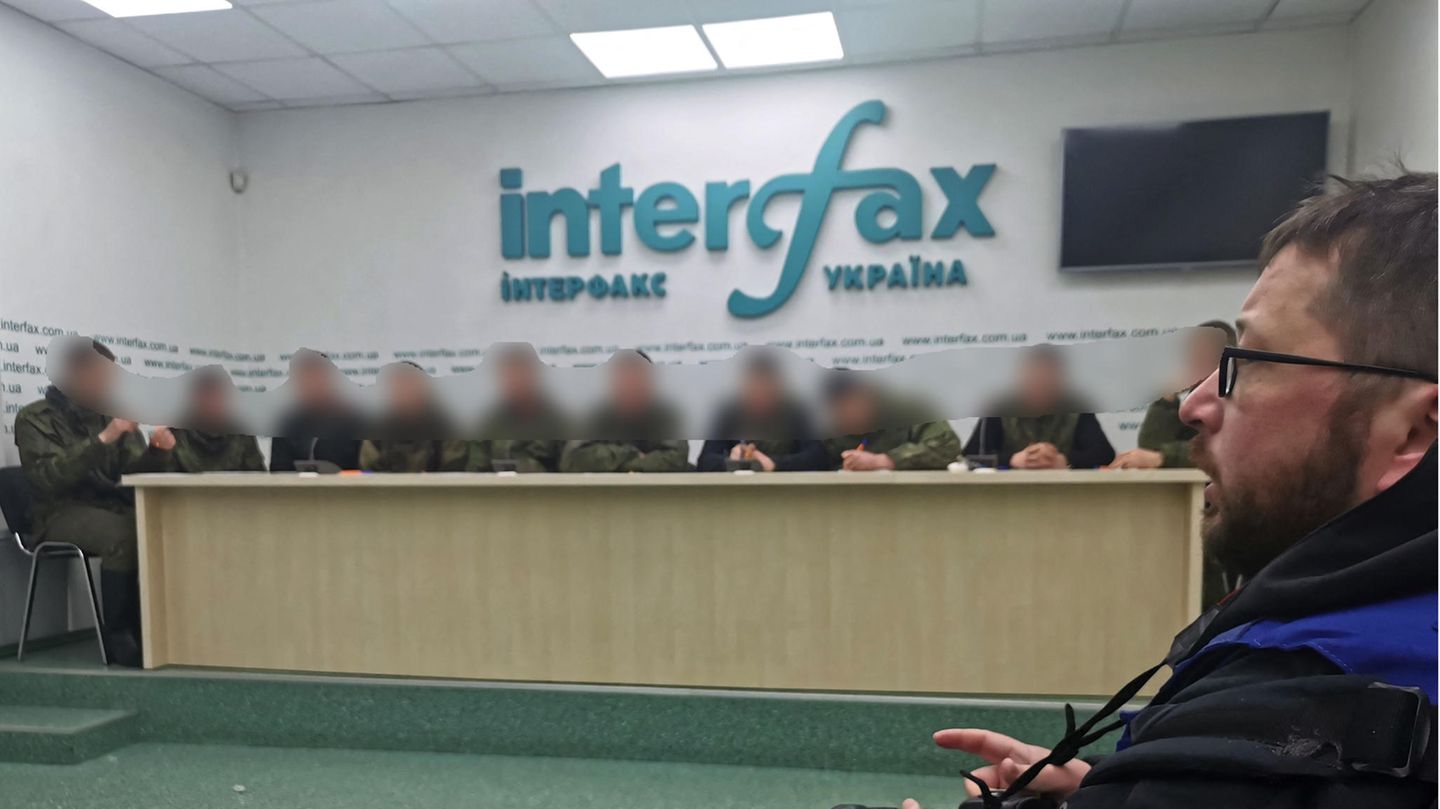Both Russia and Ukraine take soldiers as prisoners of war in the Ukraine war. Ukraine presents some of the Russian POWs to the press, lets them speak. Human rights organizations criticize this because it violates the Geneva Convention.
They sit at tables, in military clothes, some of them wounded. In front of them: microphones and journalists. According to Ukraine, they are Russian prisoners of war who are presented to the reporters there and who answer their questions. A practice that has been carried out by the authorities in Ukraine for days. It is unclear to what extent the Russian soldiers hold these press conferences voluntarily.
But the videos of such press conferences and of other Russian prisoners of war are diligently distributed in Ukraine. The goal is for Russian soldiers to report that they were exposed to Russian propaganda about the war.
The news agency also reports on these controversial press conferences. “Russians, do everything to stop this war. Neither Ukraine nor Russia needs this war. Only Putin needs this war,” a prisoner of war was quoted as saying. : “Russian conscripts, your children, die here. My comrades die. They die simply because they are deceived. Putin deceives them, sends them to their deaths.” It will, like prisoners of war from Russia, ask Ukrainians for forgiveness. It is unclear whether the statements were made under duress or pressure.
Human Rights Watch urges Ukraine to stop videos
According to President Volodymyr Zelenskyj, Ukraine has so far captured almost 1,000 Russian soldiers. According to the head of state of the Ukrinform agency, this figure was given last week at an online meeting with the chief prosecutor of the International Criminal Court, Karim Khan.
But these press conferences and videos of prisoners of war have drawn criticism from international human rights organizations. For example, the Ukrainian authorities are calling on the sharing of videos with Russian prisoners of war to stop – “especially those that show that they are being humiliated or intimidated”. Because that violates the Geneva Convention.
Human Rights Watch reports that the Ukrainian secret service SBU is distributing videos on its Telegram channel, which has around 868,000 followers, in which Russian prisoners of war apparently reveal their names and addresses. According to the human rights organization, these videos are also distributed on other channels and social media.
Amnesty International: Parties to conflict should respect the rights of prisoners of war
The human rights organization reports a video with 2.2 million views on the SBU’s Telegram channel, which shows a captured Russian soldier talking to his mother on the phone. Another shows a prisoner of war giving his name, date of birth and details of his military unit during interrogation. A video on the security service’s Facebook page with over 5.4 million views shows a prisoner of war with a wounded face and bandaged leg who says he got to Chernobyl through Belarus, according to HRW. Authorities are also said to be showing dead Russian soldiers on their channels. However, the authenticity of these videos cannot be verified.
Also warns that “the rights of prisoners of war in the Russian invasion of Ukraine must be respected according to the Third Geneva Convention”. Joanne Mariner, Amnesty International’s Crisis Response Program Director, said: “While the conflict persists, it is vital that all parties to the conflict fully respect the rights of prisoners of war.” Public appearances by prisoners of war could endanger them and their families when they are returned to their home country.
Geneva Convention protects prisoners of war
“The obligation to protect prisoners of war from being objects of public curiosity, as well as protection from intimidation or humiliation, is part of the broader requirement to ensure their humane treatment and protect their families from harm,” said Aisling Reidy, Senior Legal Advisor at Human Rights Watch.
However, HRW also stresses that it has documented “widespread violations of the laws of war and flagrant war crimes by Russian forces, including indiscriminate attacks on civilians with cluster munitions and other weapons and preventing civilians from fleeing combat zones.”
The human rights organizations refer to , more precisely to the Third Geneva Convention. This states: “Prisoners of war shall at all times be treated humanely. Any unlawful act or omission by the Detaining Power which causes death or seriously endangers the health of a prisoner of war in his custody is prohibited and shall be regarded as a serious breach of this Convention.” In addition to mutilations and forced medical interventions, prisoners of war must also be “protected at all times, in particular from acts of violence or intimidation, as well as from insults and public curiosity. Reprisals against prisoners of war are prohibited.”

Vitali Klitschko: Press conferences are a means against Russia’s propaganda
Despite the criticism, Kiev Mayor Vitali Klitschko defends this practice. “I don’t organize these press conferences, but I think it’s important that people understand how big the influence of propaganda is and that the people in Russia are ‘zombified’,” he told Danish Radio. “While the whole world can see that Russia’s war is an attack on human rights where civilians are dying, ordinary Russians are being told that the war is justified,” he added. Therefore, the videos of Russian POWs are a means to stop Russian propaganda.
Human Rights Watch also called on social media platforms to clarify “whether and how videos of prisoners of war that are inconsistent with the Geneva Conventions fall under their existing guidelines.” If necessary, these would have to be adjusted in order to suppress the distribution of such content. In addition, Ukraine should ensure that the International Committee of the Red Cross (ICRC) has access to all prisoners of war.
The President of the ICRC, Peter Maurer, wants to travel to Moscow to enable visits to prisoners of war. Maurer told the AFP news agency on Monday that he would be meeting with senior officials from the defense and foreign ministries in the coming days.
Ukraine wants to exchange prisoners – or keep them for reconstruction
The trip follows Maurer’s visit to Ukraine last week. According to his own statements, he received “very positive information” from both sides “regarding our mandate and our role within the framework of the Geneva Conventions”. One of the ICRC’s main roles in conflict situations is to help ensure that prisoners of war are treated humanely and can communicate with their families.
So far, the organization has not been given access to prisoners by either warring faction. However, he had “received information that will enable us to start large-scale visits to prisoners of war very soon,” said Maurer. The ICRC always emphasizes its neutrality. It is dependent on agreements between the conflicting parties. “We are unable to enforce anything,” he said.
Ukraine said it would exchange Russian prisoners of war. However, not all. According to Ukraine’s first deputy interior minister, Yevhen Enin, prisoners of war are also to be used to help rebuild Ukraine. “Ukraine acts strictly in accordance with international norms of humanitarian law, in particular the Geneva Convention, which is an integral part of Ukraine’s national legislation,” he stressed.
The Deputy Prime Minister of Ukraine, , also stated that Russian prisoners of war in Ukraine will be exchanged – or punished. “We will work in accordance with international humanitarian law. And we will definitely set up an exchange fund.”
Liudmyla Denisova, the Ukrainian parliament’s commissioner for human rights, also said loudly: “We agreed not to disseminate data on the number of prisoners. We must do everything possible to exchange them.”
It also reports on Russian prisoners of war who wanted to stay in Ukraine for fear of their lives if they returned to Russia. A POW is quoted as saying, “If we’re exchanged, we’ll be shot by our own people.” Again, it is unclear whether these statements were made at a press conference under pressure.
Other sources: News agencies DPA and AFP
Source: Stern
David William is a talented author who has made a name for himself in the world of writing. He is a professional author who writes on a wide range of topics, from general interest to opinion news. David is currently working as a writer at 24 hours worlds where he brings his unique perspective and in-depth research to his articles, making them both informative and engaging.



